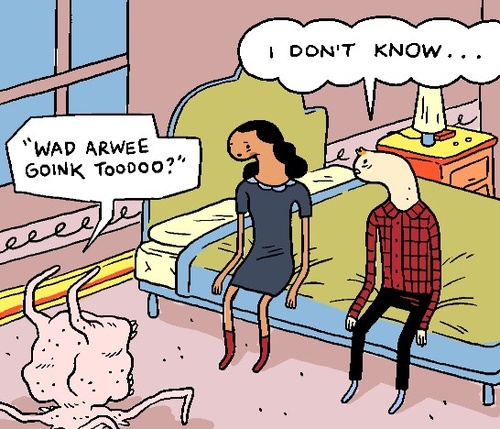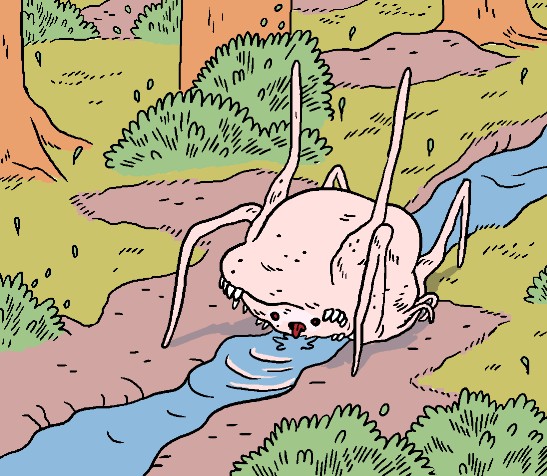
Interview With Michael DeForge
The cartoonist behind Maisonneuve's regular comic, Rescue Pet, on the cute, the unsettling and his "go-to source of humour."
Clancy, Mayumi and Marcus, the stars of Michael DeForge's comic Rescue Pet.
Michael DeForge is a Toronto-based cartoonist and the winner of two Doug Wright Awards for Canadian comics. "If the Doug Wright Awards were the Oscars," wrote journalist Jeet Heer earlier this year, "DeForge is fast emerging as our equivalent of Jack Nicholson or Meryl Streep: an artist whose work has to be constantly up for consideration."
DeForge's signature characters are creatures slightly too adorable to be frightening, but still dark enough to be disturbing. He is a master of warping traditional characters, situations and genres. His plots often revolve around transformation. DeForge's work is also very funny, but always weirdly or wistfully so.
Since last spring, DeForge has drawn a comic for Maisonneuve called Rescue Pet, featuring a chameleon-like "dog" and his hapless owner. In his trademark twisted take on cuteness, he explores the endearing relationship between pet and person—although the cartoonist admits that he doesn't actually own any pets himself. The last instalment of Rescue Pet appears in our current issue, Winter 2011.
Eric Mutrie: The comic's eponymous "rescue pet" is Clancy, a sort-of dog whose owner, Marcus, describes as looking something "like a cooked shrimp." But Clancy also has the ability to shape-shift into a decent imitation of Marcus. Was this supposed to be an exaggeration of the old adage that dogs resemble their owners?
Michael DeForge: It was! The concept started out as a small sketch of Clancy standing next to his owner, with both of them sharing the same goofy expression on their face. I liked it enough to keep going with it.
EM: Clancy also makes for a lot of fun wordplay. He can't actually speak English, but parrots other characters with alternate spellings ("warning" becomes "warn ink") and strikes comic gold with a couple of his remixes (such as when "I am stupid" becomes "I ams too pet"). You're a very talented wordsmith. Tell me about how you toss around phrasings or wordings in the writing process.
MD: I thought it'd be a funny way to show how mannered and unnatural Clancy's repetitions were. My friend Ryan Sands actually pointed out a Calvin and Hobbes strip where Calvin is visited by a shape-shifting alien. The shape-shifter mimics Calvin's speech in a way similar to how Clancy mimics Marcus'. I must have absorbed that strip as a kid, and spewed it back out as the first instalment of Rescue Pet.
EM: The changing seasons are reflected in the different instalments. For example, part three, which was published in Maisonneuve's fall issue, took place in a park and the images were big on orange. How did you approach the quarterly nature of the magazine, in terms of pacing out a story over the course of a year?
MD: I didn't want to put the story on too rigid a timeline, but wanted to show that part one and part two took place a few months away from each other. Also, it's just nice to use different color schemes—it would have been boring if I had to colour all the trees the same way each instalment.
Pacing the story out wasn't too difficult, since I had a pretty solid idea of what would happen in the comic from the start. I did try to make each instalment accessible enough that a reader who hadn't read the previous issue of Maisonneuve could still find it funny and understand what's going on.

Clancy takes a drink in the last instalment of Rescue Pet.
EM: Your style toes the line between grotesque and whimsical, and your stories strike a similar balance. In part two, you find very relatable situational humour in Marcus's relationship with his girlfriend's mother, but you also have a pseudo-dog with teeth growing out of his chest transforming into a man who's just cracked ("CRAK!"-ed) his head on a mirror.
MD: I generally enjoy character designs that are both "cute" and unsettling. Hideshi Hino is a big influence on me, and his comics are the best for that.
As for my writing, most of my comics feature characters underreacting to some surreal or horrifying thing happening to them. They're either underreacting or not even aware that there's something wrong at all. It's often been a go-to source of humour for me.
EM: To touch on your other work, I loved this past summer's "Peter's Muscle," which centres around an uncomfortable sex scene between Spider-Man's Doctor Octopus and Peter Parker's Aunt May. You've explored superhero comics and, in your re-imagining of newspaper comic logos in heavy-metal style, old-school syndicated dailies. You know these popular roots, but you have also done great stuff poking fun at them.
MD: I've drawn a lot of comics that directly and indirectly reference other comics, but the reasoning behind it is different from strip to strip. My first comics growing up were Peanuts, Bloom County and Calvin and Hobbes, since those were the comics my family had lying around. I did read superhero comics later, as my dad used to read them. For "Peter's Muscle," I've always liked the bizarre Spider-Man story arc in which Dr. Octopus dates Aunt May, and I thought it would be an interesting one to riff off of.
EM: You generously post a lot of your work for free on your blog—specifically, your biweekly strip about ants, Ant Comic.
MD: I still prefer print as a medium, but putting work online has a lot of advantages. No weekly paper is going to print a full-page, full-colour comic strip like Ant Comic, for example. It's also nice to put work up that's been out of print.
I just want my comics to be accessible, really. I think a lot of the people who've enjoyed reading the work I put online for free have gone on to buy the actual comics from me at some point.
EM: This has been a huge year for you. You won a Doug Wright Award for your comic Spotting Deer, an Ignatz Award for Lose #3 and, most recently, your strip "Queen" has been included in this year's collection of The Best American Comics. Congratulations! What's lined up next?
MD: Thank you! I am working on Lose #4 for spring of next year, and am self-publishing two ongoing mini comics called Kid Mafia and Open Country. Issues of each were released at this year's Brooklyn Comics and Graphics Festival. I also have short stories in the most recent issues of the Nobrow and Study Group anthologies, and Ant Comic continues to be drawn biweekly on my blog.
Read Michael DeForge's Rescue Pet in the Winter 2011 issue of Maisonneuve, on newsstands now. You can also order it online.
Subscribe to Maisonneuve today.
Related on maisonneuve.org:
—Interview with Daniel Clowes
—Kate Beaton's Revisionist History
—Generation Geek





